|
CONTENTS
Babe Ruth - 1922 World Series
Travis Jackson - 1924 World Series
Joe DiMaggio - 1936 All-Star Game
Hal Newhouser - 1945 World Series
Don Drysdale - 1965 World Series
Tom Glavine - End of '07 Season
Greats Bad Days - I
Greats Bad Days - II
Baseball
Page
Golden
Rankings Home
Top
of Page
|
Even
the Greats Have Bad Days – III
This feature discusses a game or series in which an outstanding player did not perform
well.
Babe Ruth - 1922 World Series
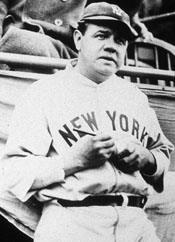
Babe Ruth
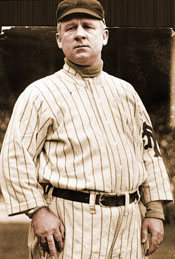
John McGraw
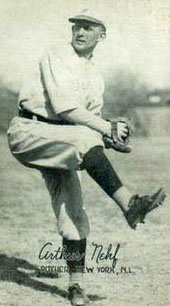
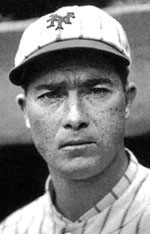
Jesse Barnes
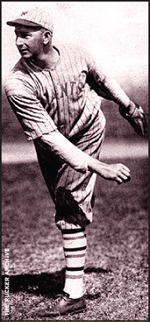
Jack Scott
|
27-year-old Babe Ruth played in his fifth World Series in 1922.
- For the first three, 1915, 1916, and 1918, he was a member of the Boston Red Sox, who of course would go 86 years before winning another Fall Classic after trading Babe to the Yankees in 1920.
- He batted just 11 times in the three Series with Boston because he was a pitcher. He garnered just a single hit, a triple in 1918 against the Cubs.
- With the Yankees in '21, he played in only six games of the eight-game Series thanks to infected arm and a bad knee. But he hit .313 (5-for-16) with a homer and 4 RBIs.
Now the Yankees appeared in their second straight Series despite Babe and Bob Meusel being suspended for the opening month of the season by Commissioner Kenesaw M. Landis for making an unauthorized barnstorming trip after the '21 Series.
- The opponent was again the New York Giants, the team with whom they shared the Polo Grounds while waiting for their own stadium to be built.
- Giants manager John McGraw seethed because the Yankees outdrew his club thanks to the wildly popular Babe.
- As the Series started, the New York Times reporter wrote: Some observers predict that McGraw will be a real "miracle man" if he pulls the Giants through this year. For one thing, the Giants enter the series with as weak a pitching staff - on paper - as one could imagine.
- But Mugsy ordered his hurlers to throw Ruth nothing but curves, most of them out of the strike zone. Increasingly frustrated game by game, Babe started swinging wildly at pitches out of the strike zone.
- The result was just two hits in 17 ABs for a measly .118 average as the Yanks managed only a tie in five games.
Game-by-game log:
- Game One: Giants 3 Yankees 2
Batting 3rd and playing RF, Babe went 1-for-4 with what would turn out to be his only RBI in the Series.
1st: Struck out on four pitches against southpaw Art Nehf.
4th: Hit into a forceout with a man on first and no outs.
6th: Singled to RF driving home Joe Dugan from 2B with the first run of the Series.
8th: Called out on strikes against Rosy Ryan.
- Game Two: 3-3 tie called after 10 innings because of darkness
Ruth again got one hit in four ABs, scoring his only run of the Series.
1st:
Facing Jesse Barnes with Dugan on 2B, grounded to 1B.
3rd:
Walked
5th: Again with Dugan on, grounded to 2B to end the inning.
7th: Doubled to the wall in LF and scored on Meusel's double.
- Game Three: Giants 3 Yankees 0
Babe went hitless and was hit by a pitch in four plate appearances against Jack Scott.
1st:
Bounced to 2B.
4th: Hit by a pitch.
6th: Grounded to 1B to strand a runner.
9th: Grounded to 2B to start the inning.
- Game Four: Giants 4 Yankees 3
0-for-3 with a walk off Hugh McQuillan.
1st: With the first two batters on at 1B and 2B, flied to Bill Cunningham, who made a sensational catch in deep CF.
3rd: Base on balls.
6th: Popped out.
8th: Popped high to 2B Frankie Frisch in short RF.
- Game Five: Giants 5 Yankees 3
Another 0-for-3 with a sacrifice facing Nehf.
1st:
Bunted Dugan to 2B.
4th:
Fanned.
6th: Grounded back to the P.
8th: With Dugan on first, grounded out to 1B.
The Giants jockeyed Babe relentlessly through the Series.
- The leader was reserve Johnny Rawlings, whose penetrating voice spewed fouler and fouler epithets.
- After the third game, Babe could take it no more. After getting dressed, he and Meusel stormed the Giants clubhouse.
- Robert Creamer tells the story of what happened like this:
"Where's Rawlings?" Ruth demanded.
"Right here," said the infielder, who was six inches shorter and sixty pounds lighter.
"You little bastard," Ruth said, "if you ever call me that again I'll choke you to death."
Rawlings, still sitting by his locker, grinned at him. "Can't you take it?"
"I can take plenty, but I can't take that." ...
Earl Smith, one of the Giants' catchers, ... asked, "What did he call you, Babe?"
"He called me a nigger."
"That's nothing," Smith said. ...
Ruth was calming down rapidly, and when one of McGraw's coaches told him he'd better leave, he said, "All right, I know I shouldn't have come in here, but I wanted to get things straight. Listen, I'm sorry, fellows. Tomorrow, let's cut out the rough stuff and just play baseball."
Heinie Groh, the Giants' third baseman, hooted. The day before, Ruth had slid into Groh like a fullback hitting the line. "Baseball?" Groh said. "Look who's talking. Yesterday I thought we were playing football."
Everybody laughed. Ruth and Meusel started to go, but at the door Babe turned back for a moment: "Don't get me wrong, fellows," he said seriously. "I don't mind being called a prick or a cocksucker or things like that. I expect that. But lay off the personal stuff."
Then he left.
Ruth would play in five more World Series.
- He compiled a .326 post-season BA (42-for-129) with 15 HRs, 33 RBIs, and 37 R.
- But in 1922 the Giants had his number.
|
Travis Jackson - 1924 World Series
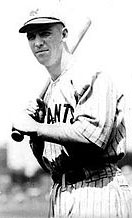
Travis Jackson
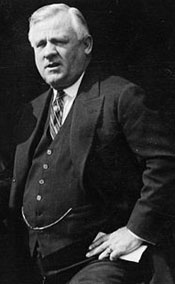
John McGraw 1924
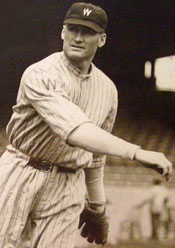
Walter Johnson
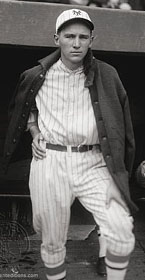
Fred Lindstrom
|
Travis Jackson was elected to the Hall of Fame by the Veterans Committee in 1982.
- He played all 14 seasons of his MLB career with the New York Giants from 1923-1936.
- "Stonewall," as any Jackson from Arkansas was called, played primarily at SS before switching to 3B his last two seasons.
- Travis compiled a .291 lifetime average in just over 6,000 ABs.
- He made the NL team for the first All-Star Game in 1934.
Jackson played in four World Series for the Giants spread over 13 years.
- He made just one plate appearance in the 1923 Fall Classic against the Yankees.
- The following season, John McGraw's Giants won their fourth straight NL pennant and met the Washington Senators for the championship.
- And that's where Jackson added his name to those greats who have suffered through miserable World Series.
Travis cracked only two base hits, both singles, in 27 ABs.
- Game One
Batting 7th, Jackson went 0-for-3 with a walk and a strikeout against the immortal Walter Johnson.
He also muffed a pop fly to open the bottom of the 12th
which led to an unearned run. Fortunately, the Giants had plated two in the top of the innings to hold on, 4-3.
- Game Two
Travis went hitless in four trips with another K as the Senators evened the series with a run in the bottom of the 9th to reverse the 4-3 score from the day before.
- Game Three
Back in the friendly confines of the Polo Grounds,
Travis garnered his first hit of the Series, a weak grounder toward 3B that he beat out in the 8th. He had scored a run earlier after hitting into a forceout but also struck out again.
New York prevailed 6-4.
- Game Four
Another 0-for-4, but he ended his streak of striking out in each game.
The Senators tied the Series again with a 7-4 triumph.
- Game Five
The Giants peppered Johnson for 13 hits, and Jackson had one of them along with a sacrifice fly to drive in his first run of the Series. He led off the bottom of the 3rd with a ground single between SS and 3B and scored the first run of the game. His run-scoring fly came in the 8th.
The McGraw Men beat Big Train again, 6-2.
- Game Six
Back home in Griffith Stadium, the Senators stayed alive with a 2-1 victory behind Tom Zachary.
Jackson's average sank to .095 after he went hitless in three ABs. Adding to his futility was hitting into a 4-6-3 DP to end the 4th. He came up again in the 7th with the tying run on 1st but lined out to LF.
- Game Seven
In one of the most famous final games in World Series history, the Senators scored two to tie the game in the 8th and scored the Series-winning run on a bad hop single in the 12th to give Johnson what would turn out to be his only postseason victory.
Jackson's average sank to .074 after an 0-for-6 performance. He also committed two errors, the second of which helped the Nats score the walkoff run in the 12th.
With one out and Muddy Ruel on 2nd, Johnson rapped a hard grounder to Jackson, who fumbled the horsehide. 3B Lindstrom recalled: [Jackson] said later that Ruel, coming down the line from second, had obscured the play for a moment and made him lose the cadence of the ball for just that split second. ...
The next hitter, CF Earl McNeely, smacked what looked like a sure DP grounder straight to Lindstrom. But the ball hit a pebble and bounced high over his head to score Ruel as the home fans went wild.
Jackson would not hit well in the other two Series in which he participated either.
- In 1933 against the Senators again, he finished 4-for-18 (.222) with a double, 2 RBI, and 3 R. The Giants, with Bill Terry as their skipper, defeated the Capital Boys in five games this time.
- Three years later, the Yankees whipped the Giants in six to start their amazing run of four straight World Championships. Jackson again spanked four hits but in 21 AB (.190) with just one run and one RBI.
- His final totals for 19 World Series games:
67 AB, 10 H, .149 BA, 7 R, 4 RBI, 1 2B, 0 3B, 0 HR
|
Joe DiMaggio - 1936 All-Star Game
National League fans in Boston looked forward to seeing 21-year-old rookie Joe DiMaggio in the All-Star Game.
- The American League had won the first three annual contests, which began as "an experiment" in 1933 but had quickly become a permanent fixture of the baseball calendar.
- "The $75,000 San Francisco rookie sensation," DiMaggio was hitting .354 for the Yankees, who led the AL by 10 games at the break.
- Joe is known to history as one of the greatest CF in the game, but he played 83 games in LF or RF his rookie season. He would start in right for the All Stars.
- Note: Some newspaper accounts referred to the Yankee rookie as "diMaggio."
The game ended up being a "flop" from two points of view.
- Expected to attract upward of 42,000, the classic drew only 25,534 despite perfect weather.
- DiMaggio went 0-for-5 to earn the "goat" label in many headlines, including the New Orleans Times-Picayune.
Here's his plate appearances.
- 1st inning: 0-0
Batting third against Dizzy Dean of the Cardinals, Joe receiving a "big hand" from the crowd before hitting the first pitch for a 5-4-3 double play, erasing Luke Appling who had walked.
- 4th inning: 2-0 Nationals
Now facing Carl Hubbell of the New York Giants with Charlie Gehringer on first via a single and one out, DiMaggio popped to the SS.
- 6th inning: 4-0 Nationals
Many in the crowd booed as Joe came up with Gehringer on again, this time with a walk and King Carl still on the mound. He grounded to the mound, 1-3.
- 7th inning: 4-2 Nationals
The AL had two runs in
and had the bases loaded with two outs when Joe caught Lon Warneke's first pitch squarely and lined to SS Leo Durocher.
- 9th inning: 4-3 Nationals
With Gehringer on second with the tying run fofllowing a double, Joe popped to 2B to end the game.
DiMaggio also experienced difficulties in the field.
- 2nd inning: 0-0
Joe tried to make a shoe string catch on Gabby Hartnett's line drive that went through his legs for a triple to drive home the first run of the game.
- 5th inning: 2-0
Billy Herman slashed a hit to right and dashed to second as DiMaggio fumbled the ball. It was scored a single and an error.
Here's the Associated Press commentary on Joe's performance.
Joe DiMaggio of the Yankees picked the occasion to experience his worst one-day slump since he flashed across the star-clustered big league sky.
Rookie Joe, a national baseball hero in his first major league season, came to Boston to get the "Bronx cheer" for the first time in his life. Whether suffering from the jitters or just not having "much luck," as he ruefully expressed it, the California recruit had three chances in the field and missed two of them. Charitable scorers charged him with only one error, but his misplays figured in each of the National leaguers' scoring rallies.
Up five times against the superb pitching of Dean, Hubbell and Warneke, DiMaggio failed to get the ball out of the infield even once.
He left seven men on bases, capping the climax of his dismal day by lining out with the bases full in the seventh, to end the one scoring splurge of the Americans, and popping out in the ninth with the tying run on second base.
"The breaks were simply against the kid," said American leaguers. "His line drive to Leo Durocher in the seventh had base hit written all over it, but it happened to be directly in a fielder's hands."
"It was asking too much of a youngster to play a full game under such pressure, against such pitching, and in a comparatively strange position," countered National leaguers.
DiMag's difficulties continued for the next week.
- He went 5-for-29 for .172 in the first seven games.
- He would straighten out and compile one of the greatest rookie seasons in ML history.
.323, 29 HR, 125 RBI, 132 R, 15 3B (to lead the league)
Joe would appear in ten more All Star games.
- He never went 0-for-5 again but did have an 0-for-4 in 1940.
- He hit safely 9 times in 40 at-bats for a .225 average, 100 points below his career average.
- He slugged one HR in 1939 and had two doubles.
- His best game came in 1949 at Ebbets Field in Brooklyn when he went 2-for-4 with a double, a run scored, and 3 RBI.
|
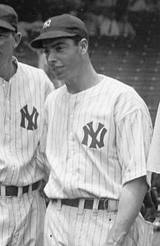
Joe DiMaggio 1936
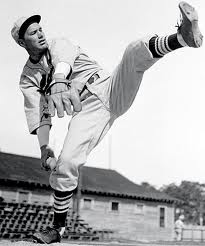
Dizzy Dean
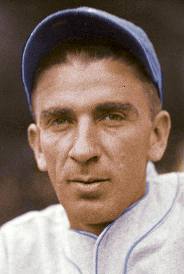
Carl Hubbell
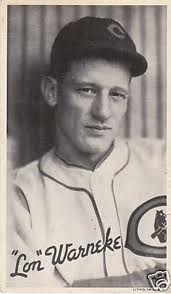
|
Hal Newhouser - 1945 World Series
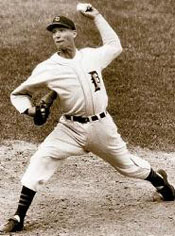
Hal Newhouser
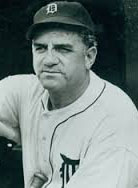
Steve O'Neill
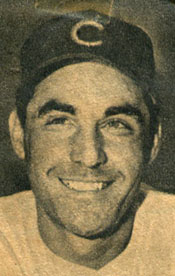
Phil Cavaretta
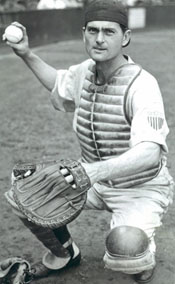
Paul Richards
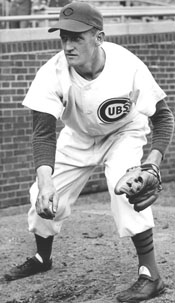
Hank Borowy
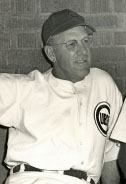
Charlie Grimm
|
24-year-old Hal Newhouser played a big role in Detroit's 1945 AL pennant.
- Rejected for military service because of a heart problem, the 6'2" southpaw won 25 games and lost only 9 with an incredible 1.81 ERA. And all this despite having problems with back spasms early in September that caused him to miss several starts.
- Hal had gone 29-9 in '44 with a 2.22 ERA.
- His teammates called Newhouser "Prince Hal" because of the stately way he carried himself.
- But writers questioned the Detroit native's ability since the ranks of MLB clubs were severely thinned by World War II.
Manager Steve O'Neill made the obvious decision to send Hal to the mound for Game 1 of the World Series against the Chicago Cubs in Detroit Wednesday, October 3.
- Newhouser last pitched the previous Wednesday, September 26, and twirled an 11-0 shutout over the Indians that kept the Tigers in 1st place, one game ahead of the St. Louis Browns.
- Detroit won the rain-soaked first game of a scheduled doubleheader on Sunday in St. Louis to clinch the pennant. The meaningless second game, which Newhouser would have pitched if necessary, was cancelled. Read about the 1945 AL pennant race ...
- Hal begged his manager to let him start Game 1 so he could pitch three games if the Series went the distance.
- Steve should have talked to Cardinals manager Billy Southworth before making his Game 1 selection. Those Cubs love a left-hander like Hal Newhouser, said Billy. My Harry Brecheen is one kind of a left-hander (who beat the Cubs four times in five starts in '45), and Newhouser is another. Harry gives 'em dipsy-doo stuff, and Hal tries to burn that ball through. They'll like that real good.
The Cubs jumped on Hal for four runs in the first inning in 47° weather.
- Newhouser retired two of the first three hitters before the onslaught began.
- 1B Phil Cavaretta beat out a roller to 2B, sending 2B Don Johnson, who had singled and stolen 2nd, to 3rd.
- A passed ball by C Paul Richards allowed Johnson to score and Cavaretta to advance to 2nd.
- So O'Neill ordered an intentional walk to CF Andy Pafko.
- RF Bill Nicholson crossed up that strategy with a triple to make it 3-0.
- Bill scored on C Mickey Livingston's single.
- The inning mercifully ended when Livingston was thrown out trying to steal 2nd.
After putting down the Cubs 1-2-3 in the 2nd, Newhouser ran into more trouble in the 3rd.
- Johnson again started the uprising, this time with a double.
- LF Peanuts Lowrey bunted Johnson to 3rd.
- Cavaretta singled home Johnson with run #5.
- Pafko doubled in Cavaretta.
- After Nicholson popped out, Livingston singled in Pafko.
O'Neill replaced his ace with Al Benton.
- Newhouser's bottom line: 2 2/3 innings, 8 hits, 7 runs (all earned), one BB, three Ks
- The Cubs romped 9-0 behind their ace, Hank Borowy.
Jubilent Chicago manager Charlie Grimm couldn't resist gloating.
- Did we paste Newhouser or did we paste him? We've got the running start we needed. ... When we saw Newhouser was wild, we just started hitting that "cripple" pitch, the one he threw when the count was two balls, or one strike and three balls.
- Perhaps thinking about the motivational effects his words might have on the vanquished hurler, Jolly Cholly added: Newhouser had good stuff, but we just waded into him. Don't take it away from him, boys, he's a helluva pitcher.
- Hal: I simply didn't know how to pitch to them. They're all new to me. You can't throw to those guys simply from advice. All I knew about them was what others told me. You can't necessarily expect to handcuff a fellow with a low fast ball just because another pitcher tells you he did it once. If a batter didn't like a slow curve one day last June, there's no reason to believe he can't hit mine. You've gotta pitch against 'em to know.
- Newhouser also acknowledged the effect the weather had on him. I had all my stuff, but it was so cold, I couldn't get the old control.
- The Tiger southpaw ended his remarks with a confident prediction. I'll get them next time. I'll get away to a good start, and I'll beat those Cubs yet.
And that's exactly what he did.
- Newhouser defeated the Cubs in Game 5 at Wrigley Field 8-4, holding them to one run over the first six innings while his mates built a 6-1 lead against Borowy. His line this time: 9 IP, 7 H, 4 R (all earned), 9 K, 2 BB
- Aided by a built-in off day between Games 6 and 7, the Prince toed the slab three days later in the final game.
- Grimm started Borowy on only one day's rest after he threw four scoreless innings in the exciting 8-7 victory in 12 innings in Game 6.
- This time, it was Hank's turn to get bombed. When the first three Tigers singled, Grimm quickly brought in Paul Derringer. When the dust cleared, Detroit had five runs.
- Hal scattered ten hits to record the 9-3 victory and deny Chicago their first World Series triumph since 1908. (The Cubs haven't even played in a Fall Classic since 1945.)
- Read about Game 7 ...
Newhouser would silence the critics who suggested he wouldn't dominate the AL when the stars returned from military service.
- Hal won 26 games in 1946 against only 9 losses with a 1.94 ERA.
- He went 17-17 in '47 with a 2.87 ERA.
- He topped the 20-win mark again in '48, going 21-12 with a 3.01 ERA. A shoulder injury, aggravated when Hal faced Bob Feller with only two days' rest in the final game of the 1948 season, prevented him from ever reaching the 20-win plateau again.
- Hal winning 33 games over the 1949-50 seasons, but his production dropped sharply after that.
- He finished his career with 207 victories and a 3.06 ERA.
- The Veterans Committee elected him to the Hall of Fame in 1992.
|
Don Drysdale - 1965 World Series
The first game of the 1965 World Series between the Los Angeles Dodgers and Minnesota Twins fell on October 6.
- Dodger manager Walt Alston would normally pitch his ace, Sandy Koufax, to open the Series. Sandy led the NL with 26 victories and an incredible ERA of 2.04.
- However, October 6 was the Jewish holy day of Yom Kippur. So Koufax elected not to pitch that day and instead attended synagogue services in Minneapolis.
- So Alston went with his #2 starter, Don Drysdale, who brought an outstanding resumé himself: 23-12 record, 2.77 ERA. Don led the league with 42 games started.
- Also, Drysdale had shut out the Yankees on three hits in the Dodgers' four-game sweep in '63.
- Don last pitched on Thursday, September 30. So he enjoyed five days rest before starting the Fall Classic.
The 6'5" righthander started fine before a standing-room record crowd of 47,797 in Metropolitan Stadium.
- He retired the Twins in order in the 1st.
- After Ron Fairly homered to put the Dodgers ahead in the top of the 2nd, 1B Don Mincher walloped a "bad slider" deep into the RF bleachers to tie the game.
The roof fell in on Drysdale in the 3rd.
- .208 hitting 2B Frank Quilici whacked a double inside the 3B line.
- P Mudcat Grant bunted back to the box, but Drysdale slipped and fell while fielding the ball. He threw to 1B from a sitting position, but the ball bounced in front of 2B Jim Lefebvre, who couldn't control the ball as the runner crossed the bag.
- That brought up Zoilo Versalles, a SS with surprising power - 19 HRs. He rifled a high fast ball into the LF pavilion to put Minnesota in front 4-1.
- LF Sandy Valdespino piled on Drysdale with a double into the RF corner.
- RF Tony Oliva grounded to 3B for the first out of the inning, Valdespino holding 2B.
- The Twins' leading HR man with 25, 3B Harmon Killebrew singled to LF, the runner stopping at 3B.
- Drysdale gave himself a chance to get out of the inning without further damage by striking out CF Jimmie Hall.
- Mincher walked to load the bases.
- C Earl Battey dunked a single into RF, scoring Valdespino and Killebrew as Mincher took 3B.
- The pesky Quilici singled to RF, scoring Mincher to make it 6-1. Only two of the runs in the outburst were earned.
- Finally, Alston went to the mound to take out his starter. Drysdale greeted his skipper with, I bet right now you wish I was Jewish, too.
- The Twins coasted to an 8-2 victory.
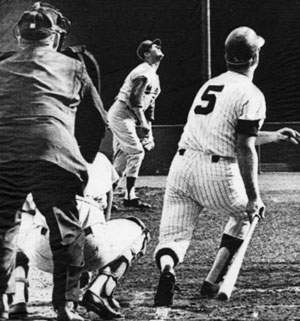
Drysdale watches Mincher's HR. Drysdale offered no excuses.
- "I did not have good control and didn't have my good stuff, and I just got beat. I'm just glad this came in the first game instead of the seventh."
- He said his left knee, which had given him trouble earlier in the season, gave way on the bunt to the mound but popped back in place when he got up. He said it didn't bother him.
- Alston explained why he left his hurler in after four runs had scored in the third. "At the time, Earl Battey was up with the score 4-1 and I would rather have Drysdale pitching to Battey than anyone else. Battey's hit wasn't a very good one, just a flubber, but it killed us.
Some of the postgame talk centered around spitballs.
- Grant could be seen spitting into his glove before he threw. However, he claimed that he did so only "to rub them [the baseballs] up. I don't think you should throw a slick ball. But I'm not saying I don't throw a spitter. Besides, I don't really think it makes any difference. I don't think any good hitter will let it bother him. Besides, I wiped it off every time."
- Twins skipper Sam Mele snorted: "We got the impression that Don was using the spitter. If they can get away with it, what the hell is the difference? I don't know if my guy throws one or not. Ball players in the other league all say Drysdale does, and my scouts reported the same. Our batters came back and said he was throwing it. So what? We called for the ball only once - when Sandy Valdespino was batting - but it was put back into play so it must have been alright."
- Alston's only comment was, "I didn't notice any spitters."
The Dodgers and Drysdale bounced back.
- Koufax took the hill the next day and threw well, surrendering only two runs - one of which was unearned - in six innings. But Jim Kaat pitched better for Minnesota to take the game 5-1 and send the Series to the West Coast with the Twins holding a 2-0 lead.
- Claude Osteen pitched a masterful 5-hit shutout as LA gained a must-win in Game 3.
- Drysdale redeemed himself in Game 4, twirling a 5-hit complete game to even the series, 7-2.
- Sandy continued the great Dodger pitching in Game 5, firing a four-hit shutout with 10 Ks to give the Dodgers a game lead, 7-0.
- Back home for Game 6, the Twins stayed alive against Osteen, 5-1.
- Alston eschewed Drysdale and instead sent Koufax to the hill with two days rest in Game 7. (There was no day off for travel that year.)
- Sandy responded with another shutout, and the Dodgers plated the game's only two runs in the 4th to win their fourth World Series in eleven years.
|
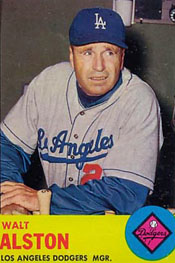
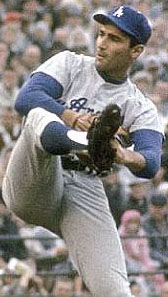
Sandy Koufax
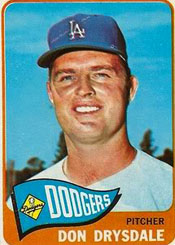
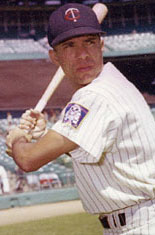
Zoilo Versailles
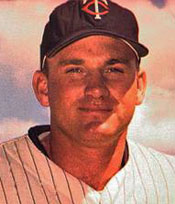
Harmon Killibrew
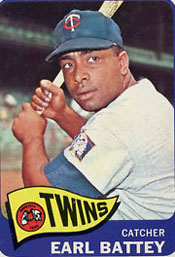
|
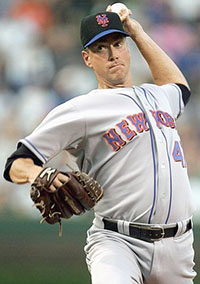
Tom Glavine
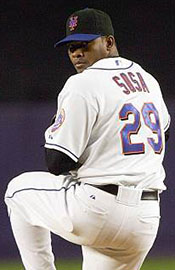
Jorge Sosa
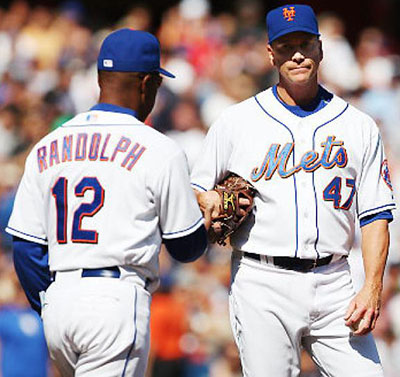
Randolph takes out Glavine in 1st inning of final game
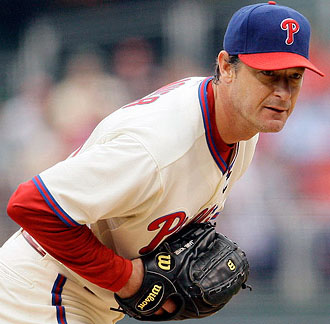
Jamie Moyer
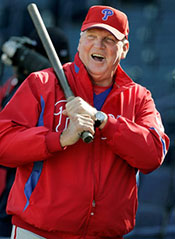
Charlie Manuel
|
The 2007 New York Mets held a seven-game lead over the Philadelphia Phillies in the NL East with 17 games to
play.
- As one commentator put it, Mets Manager Willie Randolph "drove the Mets down the stretch at Mauch 1 speed." (This was a clever reference to the 1964 Phils' collapse under Gene Mauch.)
- While the second-place Phillies went 13-4 down the stretch, the Mets won just 5 of 17.
- If the New Yorkers had won just one more game, they would have at least tied for the East and qualified for a one-game playoff against Philly. As it was, they didn't even gain the wild card spot because the Colorado Rockies, runners-up to the Diamondbacks in the West, won 90 games to their 88.
One of the reasons for the Mets' collapse was the poor performance down the stretch of their 41-year-old starting lefthander, Tom Glavine.
- His 13th and final victory came September 8 against the Astros, 3-1.
- Here's what happened in his subsequent starts.
Friday, September 14 vs Phillies at Shea Stadium
Tom pitched 7 1/3 innings, allowing only two runs. He left the mound with the score tied, and the Mets lost in the 10th, 3-1. Philadelphia swept the three-game series to reduce their deficit to 3.5 games.
Thursday, September 20 vs. Marlins at Dolphin Stadium
After ending a five game losing streak the night before to finally gain a game on the Phils, the Mets took a 3-0 lead into the bottom of the 5th. But
Glavine was touched for six hits and four runs. He finished the inning but went no further. The Mets rallied for 4 in the 9th to take a 7-4 lead, but Florida scored three in their half against relievers Pedro Feliciano and Jorge Sosa to send the game int o extra innings, then won in the 10th to cut New York's margin to 1.5 games.
Tuesday, September 25 vs. Nationals at Shea Stadium
Washington jumped on Glavine for four runs in the 1st. He pitched through the 5th, allowing single runs in the 3rd and 4th. The deficit was 6-2 when the bullpen took over. The Nats built a 10-3 lead before the Mets' rally in their last at-bat fell a run short. Their lead stayed at two games when the Phillies also lost.
Sunday, September 30 vs Marlins at Shea Stadium
The Phils had tied the Mets Thursday, then went ahead by a game the next day when New York lost their fifth in a row. But NY's 13-0 rout of Florida Saturday combined with Philly's loss to Washington threw the race back into a flat-footed tie with one game left.
And it was Glavine's turn in the rotation against the last-placeMarlins. Meanwhile, in the City of Brotherly Love, Jamie Moyer, two years older than Glavine, strode to the hill for the home team.
Here's the tale of the tape for the two veterans that day.
Moyer: 5 1/3 innings, 5 hits, 0 BB, 1 run (unearned), 6 K.
Glavine: 1/3 innings, 5 hits, 2 BB, 7 runs (all earned).
Philadelphia 6 Washington 1
Florida 8 New York 1
Congratulations to manager Charlie Manuel and the Phillies, NL East champions.
Here's Glavine's stats for his last three starts of the '07 season.
10 1/3 IP, 25 H, 4 BB, 7 K, 17 R, 17 ER, ERA 14.85
Research revealed that the '07 Mets were the first major league team to fail to finish in 1st place after owning a lead of seven games or more with 17 remaining.
Some saw the NL East finish as the baseball gods finally giving Phillies fans a break after 43 years. As Phil Sheridan wrote in the October 1 Philadelphia Inquirer: "If you're from Philadelphia, the ominous thunderhead of 1964 hangs over you, casting a permanent shadow of nagging doubt in your sports psyche. But if you were too young to see or to remember that infamous collapse, watching these Mets has given you a feel for what it must have been like."
The collapse did not immediately cost Willie Randolph his job.
- He returned for the '08 season but a 34-35 start caused his departure midway through the campaign with coach Jerry Manuel finishing the year.
- In the meantime, Glavine wrapped up his career with a token final season with the Braves, the team that drafted him in the 2nd round in 1984 and for whom he pitched 16 years before heading to the Big Apple.
- Tom was asked about his final start with the Mets when he was voted into the Hall of Fame in 2014 after compiling 305 wins. "I still get people hating me on Twitter and everywhere else over that game. Like I've said to people, for what was otherwise a lot of fun for five years, that was not the way I wanted to end things there. I wish people could get past that a little bit and look at the other good things that I did. But I understand that there's still some anger from some people out there."
|
|





























